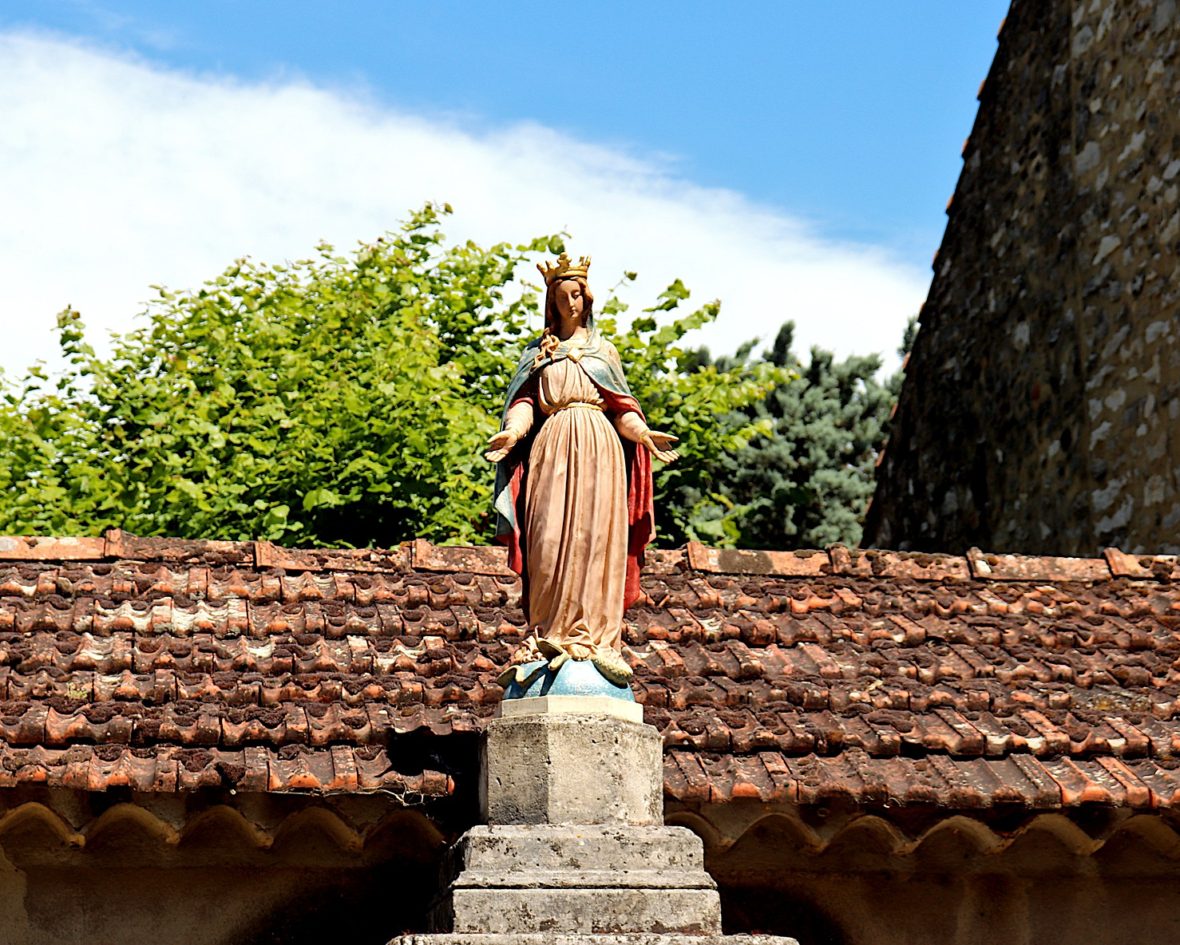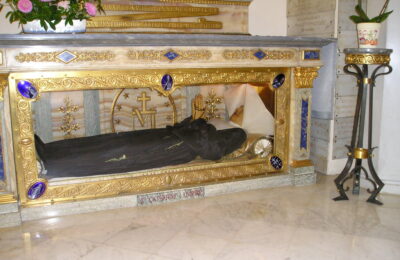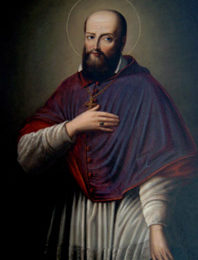I looked back over The Marian Room archives and noticed that this is the third time we have published the following piece (though changed about in format) which is primarily sourced from St. Alphonsus Liguori. In this piece, Fr. Alphonsus instructs on the topic of Our Lady, the Queen of Mercy. The last time it was published was August of 2020; and since I (and from what we’ve heard from readers) never grow tired of reading it, for today, let us see read about the Queen of Mercy:
St. Bernard asks why the Church calls Mary the Queen of Mercy. And his answer is: “Because we believe that she throws open the abyss of God’s mercies to anyone she pleases, when she pleases, and as she pleases. Hence, there are no sinners who will be lost — no matter how great their crimes — when this most holy Lady intercedes for them.” ~from The Glories of Mary by St. Alphonsus Liguori
St. Alphonsus Liguori (b. 1696- d. 1787) wrote The Glories of Mary in the 18th century. It is one of the most comprehensive books written on the Blessed Virgin Mary. Long before Google search engines, St. Alphonsus compiled this book from many sources: from the writings of saints, theologians, philosophers, Church Fathers, Biblical writers, and Church teachings. Today, I am posting an excerpt from it, for it is a treasure trove of Traditional Catholic teaching on Our Lady. In today’s excerpt, St. Alphonsus speaks of Mary’s queenship which is characterized by mercy. It is delightful, and I think you will enjoy it. The excerpt now begins:
Our Confidence in Mary Should Be Great, Because She Is a Queen The glorious Virgin was raised to the dignity of Mother of the King of Kings. Accordingly the Church honors her with the radiant title of Queen and asks us to do the same. St. Athanasius says: “If the Son is a King, then the Mother who bore Him should be looked upon as a queen and sovereign.” St. Bernardine of Siena adds: “No sooner had Mary consented to be Mother of the Eternal Word than she merited by His consent to have dominion over the whole world and over every creature.” St. Arnold the Abbot declares further: “Since the flesh of Mary was no different from that of Jesus, how can we deny to the Mother the same royal dignity we find in the Son? . . . So I would consider the glory of the Son not as something shared with His Mother, but as her glory too.” If Jesus is the King of the universe, then Mary is its Queen. And as Queen, she possesses by right the whole Kingdom of her Son. St. Bernardine of Siena argues this way: There are just as many creatures serving Mary as there are serving God. For since Angels and human beings, all things in Heaven and earth, are under God’s dominion, so they are at the same time under Mary’s dominion. The Abbot Guerricus turns to the Mother of God and exclaims: “O Mary, dispose with confidence of your Son’s riches! Go on acting boldly as Queen, Mother, and Spouse of the King, for you have dominion and power over all creation!”
So Mary is a Queen. And, for our consolation, we ought to remember that she is a most tender and kind Queen, eager to help us in our miseries. So much so that the Church wants us to call her in this prayer a Queen of Mercy. Hail, Holy Queen, Mother of Mercy! The title of queen implies compassion and charity for the poor. The title of empress implies severity and rigor. So the greatness of kings and queens consists in relieving the wretched. Tyrants have their own good in view. Kings should have their subjects’ good in view. That is why kings, when they are consecrated, have their hands anointed with oil — since oil is the symbol of mercy. Kings then should spend themselves chiefly in works of mercy. However, they should never neglect punishing the guilty.
But it’s not that way with Mary. She is a Queen, but not the Queen of Justice, punishing the guilty. She is the Queen of Mercy, full of compassion and pardon for sinners. This is why the Church makes us call her expressly “the Queen of Mercy.” John Gerson, Grand Chancellor of Paris, observes that the Kingdom of God, which is based on justice and mercy, was divided by our Lord. He kept the Kingdom of justice for Himself and gave the Kingdom of mercy to Mary. At the same time, He arranged that all mercies dispensed to human beings should pass through her hands and be disposed just as she pleases. St. Thomas Aquinas confirms this. He says: “When the Blessed Virgin conceived the Eternal Word in her womb and gave Him birth, she obtained half the Kingdom of God. She became Queen of Mercy and her Son remained King of Justice.” Is it likely that God will refuse her anything? Is there anyone who has never heard of the power of Mary’s prayers? The law of clemency is on her tongue (Prv. 31:26). Every prayer of hers is like an established law for our Lord, obliging Him to be merciful to everyone for whom she intercedes. St. Bernard asks why the Church calls Mary the Queen of Mercy. And his answer is: “Because we believe that she throws open the abyss of God’s mercies to anyone she pleases, when she pleases, and as she pleases. Hence, there are no sinners who will be lost — no matter how great their crimes — when this most holy Lady intercedes for them.” But maybe you fear that Mary simply will not intercede for certain sinners because their crimes are so terrible. Or maybe we ought to feel awe before a Queen so holy and exalted! This is not the case at all, says St. Gregory the Great. The holier she is, the greater is Mary’s compassion for sinners who come to her with the determination to do better.
Kings and queens, because they are invested with majesty, do inspire awe and make their people fear to come near them. But how can any poor sinner fear to approach this Queen of Mercy? She inspires no terror, shows no severity to anyone, but is so tender and gentle! The Roman historian Suetonius relates of the Emperor Titus that he could never refuse a favor, and sometimes even promised more than he was asked. When someone blamed him for this, he said that no ruler should ever send anyone away unsatisfied when he had admitted that person to audience. Of course, Titus must often have made promises he did not really intend to keep, or at any rate found it impossible to keep. But our Queen can never make false promises, and certainly she has the power to obtain for her clients anything she wants. Then St. Bernard asks: “Who are the most logical candidates for mercy if not the miserable? And since you are the Queen of sinners, it follows that I am the first of your subjects. So how can you help showing me mercy, O Lady?” Have pity on us then, Queen of Mercy, and remember our salvation. Accordingly St. Gregory of Nicomedia exclaims: “O Blessed Virgin, never say that, because our sins are too numerous, you cannot help us. No matter how numerous they are, they can never outweigh your power and your compassion. “Nothing resists your power. For God the Father looks upon your glory as if it were His own. And God the Son, taking delight in glorifying you, grants your every petition as if He were paying a debt.” Mary is under an infinite obligation to the Son because He chose her to be His Mother. At the same time, it must also be allowed that the Son is under great obligation to her because she gave Him His humanity. Hence, Jesus, to pay (so to speak) what He owes to Mary, and glorying in her glory, honors her in a special manner. He listens to all her requests and grants them. Our Blessed Lady once said to St. Bridget in a revelation: “I am the Queen of Heaven and the Mother of Mercy. I am the joy of the just and the door through which sinners come to God.” “There are no sinners on earth so unfortunate as to be beyond my mercy. For even if they receive nothing else through my intercession, at least they receive the grace of being less tempted by the devils than they would otherwise be.” “Unless the last irrevocable sentence (of damnation) has been pronounced against them, there are no persons so abandoned by God that they will not return to Him and find mercy, if they invoke my aid. I am called by all the Mother of Mercy. It is my Son’s mercy toward human beings that has made me merciful too.” “I am compassionate toward all and eager to help sinners. Those who have it in their power here on earth to invoke me and yet refuse to do so are foolish. In failing to call upon me, they incur damnation and will be miserable for all eternity.”
Always turn to this most tender Queen and you will certainly be saved. Are you alarmed and discouraged at the thought of your sins? Remember that Mary was made Queen of Mercy to save the most abandoned sinners who recommend themselves to her. These will be her crown in Heaven, according to the words which her Divine Spouse addresses to her: Come from Lebanon, My Bride, come from Lebanon, come! You shall be crowned . . . from the dens of lions, from the mountains of the leopards (Song. 4:8). “From the dens of lions:” what does that mean but poor sinners who have made of their souls a lair for sin? For sin is, after all, the most hideous of monsters. (end of excerpt from The Glories of Mary)
Hail Holy Queen, Mother of Mercy!
May you have a good day.
~SCF
~Note, reading suggestions from reader: see last post on Dame Edith Sitwell, reader’s February 25th comment noted at end of post.






